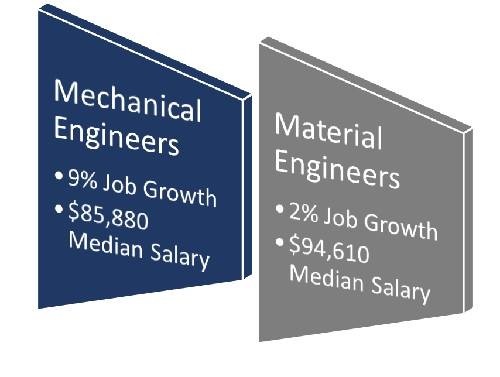With so many different engineering disciplines out there, it can be hard to decide which engineering degree is right for you. Some disciplines, like mechanical engineering and materials engineering, may sound like they have a lot in common. In fact, they do, in terms of the outcome being to apply science, math and engineering principles to solve real problems. However, mechanical and materials engineers focus on different types of problems and solve them in different ways. A mechanical engineer develops machines that fill a need, while materials engineers create new materials used in all kinds of manufactured goods. Both degree paths have their advantages, but mechanical engineering degrees offer benefits such as a better job outlook, a broader range of opportunity and more emphasis on engineering design.
IMAGE SOURCE: Pixabay, public domain
Rapid Job Growth
Job security and stability is an important factor students consider, so there is a clear benefit to having a fast rate of job growth and, in turn, more career opportunities. As a whole, engineering occupations are seeing positive job growth, with opportunities increasing at 8 percent, just a single percentage point above the growth rate expected for all occupations. The United States Bureau of Labor Statistics (BLS) reports that job prospects for mechanical engineering roles are along the same lines and are likely to grow by nine percent over a decade. Mechanical engineering is already one of the largest engineering occupations, employing 288,800 workers across America, and the predicted growth will add another 25,300 jobs.
For materials engineers, the job outlook isn’t nearly as positive. The BLS expects job opportunities for this occupation to grow by only two percent. Part of the reason for this slower than average job growth is because materials engineering roles in manufacturing industries, which account for three of the five top employing industries for the occupation, are likely to stay the same or even decline in upcoming years. As it is, materials engineer is a much smaller occupation than mechanical engineer, employing just 27,000 Americans. That anticipated two percent job growth will likely add only 400 new jobs.
Though opportunities in the occupation are fewer, materials engineers do earn more than mechanical engineers. The BLS reports a $94,610 median salary for materials engineers and an $85,880 median wage for mechanical engineers.
Broader Range of Specializations and Career Opportunities
How versatile is your degree? Mechanical engineering is among the broadest engineering disciplines. Graduates from these degree programs can go on to work in a diverse group of careers, such as robotics engineer, auto research engineer and heating and cooling systems engineer, the BLS reported. A mechanical engineer can build any imaginable machine or device that involves moving parts, including refrigerators, power generators, biomedical devices and lasers. A background in mechanical engineering can prepare you for further education or a career in any number of more specialized engineering fields, and it offers a versatile set of skills you can apply to nearly any type of engineering project. Because the field is so broad, some engineering schools allow mechanical engineering majors to narrow their education further by choosing an academic concentration such as sustainable energy, pharmaceutical manufacturing and robotics.
Materials engineering, the application of engineering principles to develop new materials, is an interdisciplinary program but is not as broad or as versatile as mechanical engineering. Naturally, materials engineering majors take coursework in general engineering principles. However, these students spend much of their time on courses such as Structural Characterization of Materials, Thermodynamics in Materials Engineering, Electronic Properties of Materials, Mechanics of Structures and Materials and Kinetics and Phase Equilibria in Materials. One of the most essential subjects for students to study is materials design, in which students learn about engineering new materials. To better prepare students for the workforce, a materials engineering program may require or encourage students to pursue a specialization in one type of material, such as metallic, ceramic or polymeric materials.
Materials engineers’ work affects not only mechanical engineers but also civil, chemical, electrical and other types of engineers. The new materials they produce become part of the repertoire from which engineers of all kinds can draw when developing their own designs.
Greater Focus on Design
Materials engineers develop new materials used for a variety of real-world situations, and there is no doubt about the importance of their work. However, developing new metal alloys or nanomaterials is farther removed from the conventional role of an engineer as a designer than the work of a mechanical engineer. In fact, materials engineers and mechanical engineers need different personal qualities as well as educational backgrounds. The BLS lists analytical skills as among the top characteristics a materials engineer needs, while mechanical engineers must possess creativity and mechanical skills. If the design element of engineering is what most appeals to you, then you may be happier with a mechanical engineering degree and career path.
Both types of engineers require math skills, problem-solving skills and communication skills, as well.
Additional Resources
Top 10 Highest Paying Engineering Careers
What Classes Will I Have to Take for a Degree in Materials Engineering?
What Are the Highest Paying Jobs With a Degree in Mechanical Engineering?
What Classes Will I Have to Take for a Degree in Mechanical Engineering?


